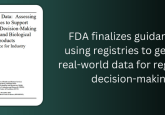Pioneering use of AI in RWD screening to detect early-stage lung cancer: technology company Clinithink announces collaboration with AstraZeneca

AstraZeneca and UK technology company Clinithink announce joint AI/RWD project to improve the early detection of lung cancer. Clinithink’s state-of-the-art healthcare AI CLiX unlock will be used to analyze unstructured electronic medical records to identify people who could benefit from lung disease screening, leading to earlier diagnosis and ultimately to improved outcomes and reduced costs.
UK technology company Clinithink and AstraZeneca Oncology UK have announced they are joining forces in a pioneering project to use AI to detect lung cancer at early stages when treatment can be more effective. The RWD study will use Clinithink’s healthcare AI CLiX unlock to screen unstructured electronic medical records to identify people who could benefit from lung disease screening, leading to earlier diagnosis of the disease and potentially improving patient outcomes and reducing costs for the NHS.
Clinithink is a UK-based technology company that has developed a cutting-edge healthcare AI, CliX unlock, that can analyze and extract information from unstructured medical notes. The vast mass of RWD data in unstructured medical records holds enormous potential to be accessed and deployed to elicit clinical insights to improve the understanding and treatment of disease. Through AI automation, these insights can be gained in a fraction of the time of that manual processing would require and at reduced cost.
Chris Tackaberry, Clinithink Co-Founder and CEO commented: “Harnessing and understanding unstructured medical data creates enormous opportunities to transform the treatment of disease, reduce NHS costs and improve population health. Our technology, CLiX unlock, can process millions of detailed medical records in hours — a process which would take years if completed manually — to deliver valuable clinical insights. We hope to use the insights uncovered in this real-world evidence study to develop predictive models that will flag high-risk individuals at a much earlier, more treatable, stage of disease – when neither they nor their GP know they have lung cancer, or even suspect it.”
Lung cancer is the second most common cancer in the UK, with 35,000 deaths annually. Currently, 75% of people are diagnosed at advanced stages III and IV, which negatively affects both treatment outcomes and costs. Early detection is crucial for outcomes, as the 1-year survival rate drops from 90% for diagnosis at stage I to only 20% for diagnosis at stage IV. Later diagnosis is associated with more intensive treatment and therefore higher costs, as well as poorer outcomes. To address this, the UK Government’s 10-year Cancer Plan aims to detect 75% of all cancers, including lung cancer, at stage I or II, and the UK National Screening Committee recommended in late 2022 that the UK should implement a national lung cancer screening program.
The new joint venture between Clinithink and AstraZeneca Oncology UK, to use AI to improve early detection of lung cancer, will be funded by AstraZeneca. Satoshi Hori, Head of Oncology Medical Affairs at AstraZeneca Oncology UK commented: “Addressing healthcare ecosystem challenges to enable earlier detection and diagnosis of cancer is one of our UK oncology missions. Focusing specifically on early detection of lung cancer, our partnership with Clinithink is a great example within AstraZeneca Oncology of an external partnership with the common goal of improving UK cancer outcomes. The project will test whether it is possible to predict which individuals might have lung cancer, while they are still at the early stages of the disease process.”
The project will begin with a pilot phase to test whether it is possible and cost effective to use the AI technology CLiX unlock to identify both symptomatic and asymptomatic individuals who are in early stages of the disease. This will be based on a retrospective analysis of patients’ unstructured electronic medical records and will include a health economic evaluation to determine if the project is scalable.
If the first phase of the project is successful, the outputs will then be used to develop prospective models that flag high-risk individuals at much earlier and more treatable stages of disease, improving survival rates and driving down the intensity of treatment needed. It is specifically hoped that the venture will enhance the national lung cancer screening program by helping to identify people under the age of 55 with early lung cancer who would otherwise have been ineligible for the nationwide screening.
Want regular updates on the latest real-world evidence news straight to your inbox? Become a member on The Evidence Base® today>>>






